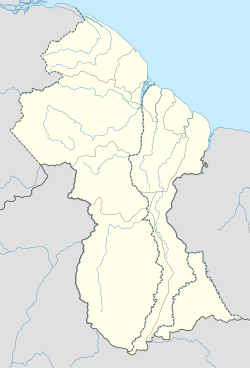Nappi, Guyana
Nappi | |
|---|---|
Village | |
 Nappi Location in Guyana | |
| Coordinates: 3°24′47″N 59°34′44″W / 3.4130°N 59.5789°WCoordinates: 3°24′47″N 59°34′44″W / 3.4130°N 59.5789°W | |
| Country | |
| Region | Upper Takutu-Upper Essequibo |
| Government | |
| • Toshao | Walter Henrico[1] |
| Area | |
| • Total | 221.20 km2 (85.406 sq mi) |
| Population | |
| • Total | 652 |
| • Density | 2.9/km2 (7.6/sq mi) |
Nappi is an indigenous village of Macushi Amerindians in the Upper Takutu-Upper Essequibo Region of Guyana.[2] It is located in the Rupununi savannah along the Nappi and Maipaima creeks[3] on the edge of the Kanuku Mountains.[1]
History[]
Nappi was settled around 1800[2] by Karu’ku and Nan’pi, two Amerindians had escaped tribal war in the Rio Negro region of Brazil. The Kanuku mountains were named after Karu'ku, and Nappi was named after Nan’pi.[1] On 28 May 1838, Nappi was visited by the explorer Robert Hermann Schomburgk.[4] The arrival of missionaries in Crashwater resulted in part of the village relocating to Nappi.[5] The main religion in the village is Christian.[2]
Overview[]
The main language spoken in Nappi is Macushi with English as a secondary language. The village has a primary school and a health care centre. The economy is based on farming.[2] Balatá bleeding, a sort of rubber, was an important economic activity in the past.[1] Internet connection is provided via free Wi-Fi.[6] Water is provided by a reservoir.[7] There is no electricity other than private diesel generators and solar panels.[2]
Two waterfalls can be found near Nappi: the Nappi Falls and Jordan Falls. There is a guest lodge in the village for tourists.[1] The village has two satellites: Parishara, and Hiawa.[2]
Nappi can be reached by car from Lethem via the Sydney Allicock Highway.[8] The nearest airport is .[9]
References[]
- ^ a b c d e "Serene Nappi". Guyana Chronicle. 21 August 2017. Retrieved 12 December 2021.
- ^ a b c d e f g h "Nappi". Ministry of Indigenous Peoples' Affairs. Retrieved 12 December 2021.
- ^ "Exploring Nappi". Guyana Times International. 17 November 2017. Retrieved 12 December 2021.
- ^ Robert Schomburgk (1840). Report of the Third Expedition into the Interior of Guayana, Comprising the Journey to the Sources of the Essequibo, to the Carumá Mountains, and to Fort San Joaquim, on the Rio Branco, in 1837-8. Vol. 10. Journal of the Royal Geographical Society of London. p. 178.
- ^ Gaulbert Sutherland (17 February 2013). "Nappi, Rupununi". Stabroek News. Retrieved 12 December 2021.
- ^ "eGovernment ICT Hubs connected to the eGovernment Network". National Datamanagement Authority. Retrieved 12 December 2021.
- ^ "Nappi reservoir handed over to region". Department of Public Information. 10 February 2018. Retrieved 12 December 2021.
- ^ "Sydney Allicock Highway commissioned". Guyana Chronicle. 16 February 2020. Retrieved 12 December 2021.
- ^ Moses Nagamootoo (24 November 2019). "My Turn - Way Down South". Guyana Chronicle. Retrieved 12 December 2021.
- Populated places in Upper Takutu-Upper Essequibo
- Indigenous villages in Guyana